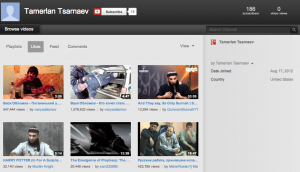In the wake of one of the most horrific attacks on our country last week, I have spent a lot of time following the manhunt, and more interestingly, the involvement of the internet in the subsequent capturing of suspect #2.
It all started with Reddit.com. The day after the explosions, Reddit users had already established deep conversations and analyses that picked apart the pictures that were taken, evidence found, and theories that were imagined. It was a crowdsourced investigation. That alone was unprecedented and newsworthy enough. So much so that innocent individuals were called in for questioning and racial profiling was a hot-button topic during the digital manhunt.
The next evening, video footage was released of the two primary suspects walking toward the finish line with backpacks on their persons. The debates heightened – especially after the individuals’ names were released to the public shortly thereafter.
And that’s when everything got even more interesting. Suspect #2’s Twitter account was quickly identified – void of any warning signs. However, suspect #1 left digital breadcrumbs that essentially became the inspiration behind this post.
See the below image of some of the videos that he interacted with on YouTube leading up to the Marathon:
It’s a little concerning when you see how he spent some of his free time online.
I know privacy on the web has become a controversial and heavily debated topic recently – and rightfully so. Everyone deserves their privacy. At the same time, however, I understand the infrastructure of the Internet enough to make a case for stronger tracking, policing, and ultimate responsibility for your personal actions – especially when it becomes a national (or even global) security issue.
Here are the facts:
– IP addresses already identify the location and access type of all web connections.
– Users CAN mask their IP addresses when browsing the web – although most don’t.
– Webmasters (website owners) WANT to track visitors to their sites so they can serve up the right version of their content to them and retarget relevant ads to them later.
– Social networks (like YouTube) don’t enforce any type of verification processes to identify the owner of a registered account.
With the above, here are some of the movements I think we need to see happen:
Extreme Solution: If everything we do in “real” life can be traced back to us, why isn’t there a digital equivalent? Digital bullying has already taken the lives of far too many – and it is difficult to stop due to too much anonymity online. If I have to use my personal phone number (that is obviously traced back to my name) to make a phone call in real life, any social comments or actions that I take online to communicate (or harm) others should also be traced back to me. This can be facilitated through two-step authorization processes. My most extreme solution would be to have a master login gateway that requires a social security number every time you access the web on a desktop machine. Mobile browsing should automatically default to a registered phone number that can be attributed to its owner.
Moderate Solution: It sounds scary but just like in the real world, we need to have la enforcement scouring the web for suspicious and unlawful behavior. Bullying shouldn’t be tolerated. Ignorance shouldn’t be allowed. Most importantly, suspicious terrorist activity should be flagged and taken care of as it occurs. Why aren’t there web scanners that partner with the strongest content crawlers on the Internet (namely Google) to track these types of actions in real-time? Since IP addresses can provide us information on the user, we’d be able to thwart future horrific attacks such as the recent bombings well before they happen.
It’s about time we start taking responsibility for our personal actions online. No longer can cowards hide behind a digital moniker and cartoon avatar. Peace will thrive through individual responsibility. Even if you disagree with me right now, with time you’ll understand that much more positive can come from online (lack of) privacy reform than harm.
